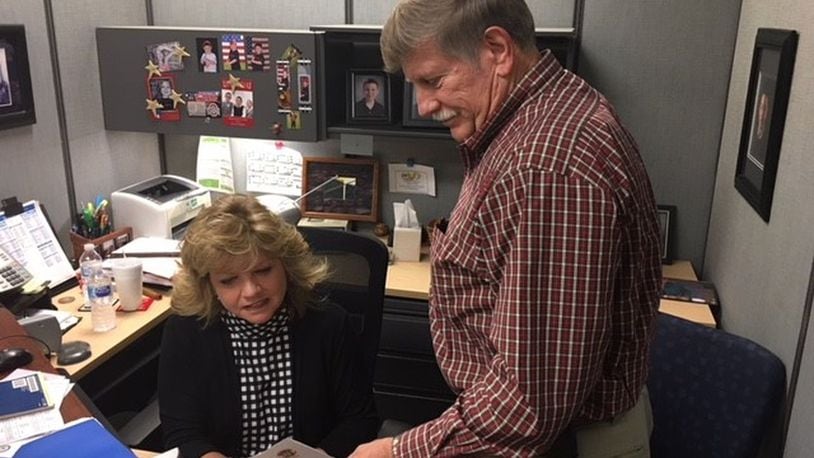Financial Management Analysis, a flight within the 88 CS, is comprised of three teams who certify financial documents from about 115 tenant organizations on the base. All three teams are configured of both accounting and budget divisions; however, each team has a different customer base.
Financial Management Analysis, Team One, focuses primarily on the 88th Communications Group, while Financial Management Analysis, Team Three, focuses on the 88th Civil Engineer Group.
Financial Management Analysis, Team Two, along with Debra Cook, supervisor accountant, and Keith Tarnovich, chief of operation support, are responsible for customers from the 88th Mission Support Group, which includes the 88th Force Support Squadron, 88th Security Forces Squadron, 88th Logistics Readiness Squadron and the 88th Operations Support Squadron.
“Each team’s focus is primarily on the customers that each of us service,” said Tarnovich. “Just within our piece of it, we certify about 1,300 documents a month.”
Cook’s team of one staff accountant and six accounting and budget technicians certifies fund availability, reviews load sheets, clears Control Summary Records and conducts end-of-month balancing.
Throughout the year, customers’ financial documents are entered into the Automated Business Supply System to purchase goods or services. At the beginning of each fiscal year, appropriated funds are passed down from Congress, to the services, major commands, centers and squadrons to purchase mission requirements.
“FMA loads the organization’s funds, then the customer is permitted to purchase authorized goods and services,” said Tarnovich.
FMA teams receive an organization’s purchase documents, then research within the accounting system to make sure they have enough funds in their account to purchase that good or service.
“If all of the documents have all of the information required, and there is money in the account, then that document can be certified,” Cook said.
Wright-Patterson AFB has about 115 tenant organizations on the installation. The FMA office processes their collective customers’ funding documents whose totals can reach more than $25 billion annually.
According to Tarnovich, government guidelines require organizations to be at least 80 percent obligated by the end of July.
Before Sept. 30, funding gets moved down to lower levels to make those final purchases for the year end.
“We legally have to have everything committed or obligated in the system by midnight on Sept. 30,” Tarnovich said. “So it’s critical for my team to make sure we get all of the documents that are in the ABSS queue so they can be certified before the last hour.”
In addition to making sure all organizational obligations are met by the end of the fiscal year, FMA overall also works as advisors to local organizations to help guide them on fiscal laws.
“We’re a customer service organization and our customers are our number one priority,” said Cook.
Unfunded requirement lists are also a part of what Financial Management Analysis, Teams One, Two and Three accomplish. They assist organizations with “as requested” unfunded requirements throughout the year.
Unfunded requirements are those items or services that don’t always fit within an organization’s budget or they don’t receive funding to execute.
“An unfunded requirements list has things that organizations need to purchase, as their mission fluctuates or changes according to Air Force senior leaders,” said Tarnovich. “We help guide them on how much funding they have, what the fund can be spent on, if the good or service is appropriate and if their purchase requests meet the fiscal law rules of purpose, time and amount.”
Quarterly meetings with the 88th Air Base Wing leadership, Financial Management Boards, focus on the prioritization of those unfunded requirements.
“We collect those unfunded requirement lists and help prioritize them through their organizations and the group resource advisor,” said Tarnovich. “We then advise wing leadership, who then reviews the lists and votes on a wing priority to fund with any available resources provided internally or by higher headquarters.”
“We’re just one small piece of the organization, keeping the wheels turning: ‘No money/no mission’,” he said.
About the Author
